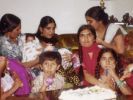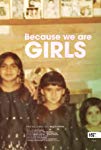Eye For Film >> Movies >> Because We Are Girls (2019) Film Review
Because We Are Girls
Reviewed by: Jennie Kermode

In northern British Columbia, in the small mill town of Williams Lake, Jeeti, Kira and Salakshana grew up with secrets – the same secret, in fact, but they wouldn’t know that for years because they hesitated to share it even with one another. What that secret was will not surprise any viewers of this film – it’s one they share with millions of children around the world. In this case, however, it’s complicated by the experience of isolation that being a member of an ethnic minority can bring, and by membership of a culture that systematically devalues girls.
As part of the only Punjabi family in a predominantly white area, the sisters experienced racism from early childhood, limiting their ability to make friends outside their family. All three feel that their parents paid little attention to them, especially after their younger brother, Jesse, was born. Their mother was always trying to help relatives move over from the Punjab and become Canadian citizens, putting them up in the family home until they got settled, which gave a predatory cousin easy access to the girls – and because they felt starved of attention, they were easy targets for grooming. Their sense of what was normal was quickly distorted. Though new to the family, their cousin had complete authority over them because they were girls.

That defensiveness found in virtually all immigrant communities looms large here. it’s seen as vital not to bring shame to the family, not to make the community look bad in a context where outsiders are all too willing to buy into negative stereotypes and assume the worst. Caught at the intersection of sexist and racist prejudice, the girls struggled to value themselves. Mainstream Canadian media didn’t present them with any images of girls who looked like them. They found those images in Bollywood films, but in those films women had little agency and were frequently shown being beaten or shamed by men, shaping their view of what they could expect from the world. Extreme notions of gender were continually enforced. Men, for their part, were assumed to need women to cook for them so that they wouldn’t starve.
How did it change? Director Baljit Sangra tracks the sisters’ story over the course of a decade, taking in their gradual realisation that they all had the same problem, and their discovery of the strength they had in unity. Despite all the ugliness in this story, it emerges as a celebration of the power of sisterhood. Their relationships were not without their ups and downs – they don’t agree on everything even now, as adult women – but through their willingness to trust and listen and forgive and support, they forged the emotional structures that were missing elsewhere in their lives. Eventually this would lead to them speaking out.
In many such narratives, this is treated as the end point in the story. Sangra knows better. She’s interested in the claims and counter-claims that follow, the frantic repositioning, the disputed narratives and attempts to save face. The first battles are, as one might expect, over the truth of the claims; then over the ways that the girls interpreted what happened; then over the proper positioning of blame. The discussions we are privy to are full of declarations of love and concern but their very form makes it clear that social matters are the first consideration.
Who, besides the abuser, is responsible when things like this happen? To what extent is culture itself to blame; and can it be changed? These questions echo throughout the film. At the centre of it, though, is the bond between the sisters themselves. Its very frank discussion of sexual violence will be difficult for some viewers but it has important things to say, especially to other survivors and to those who want to learn how to give them the support that they need.
Reviewed on: 05 Mar 2020
















